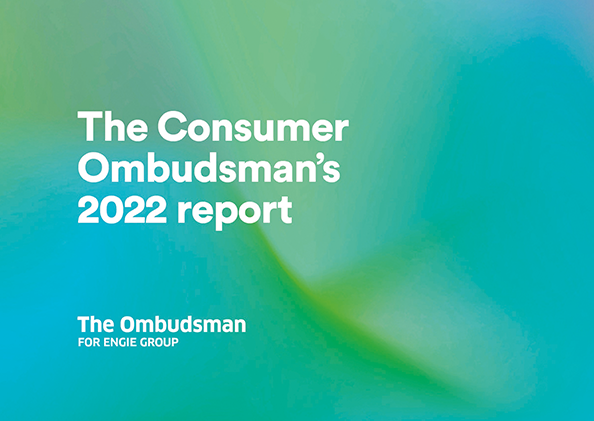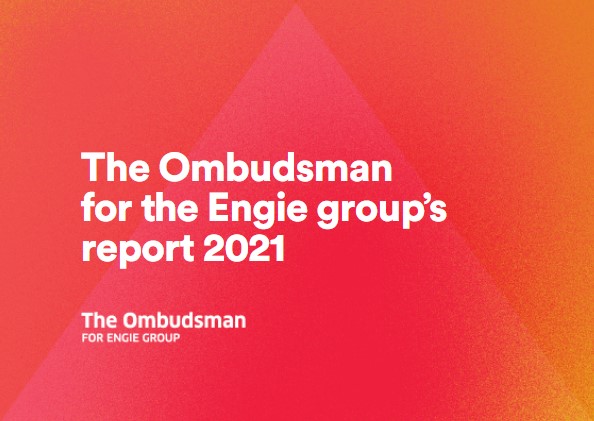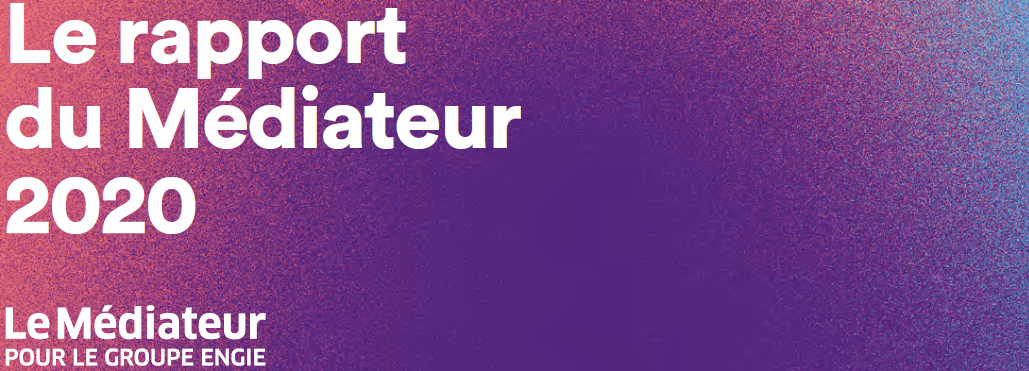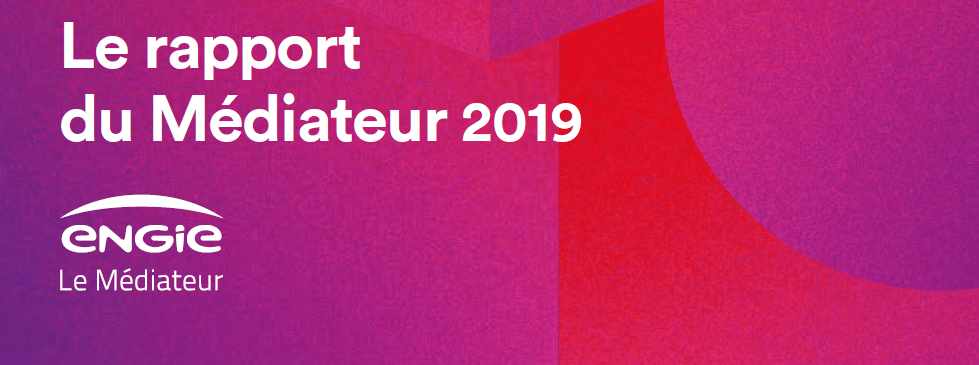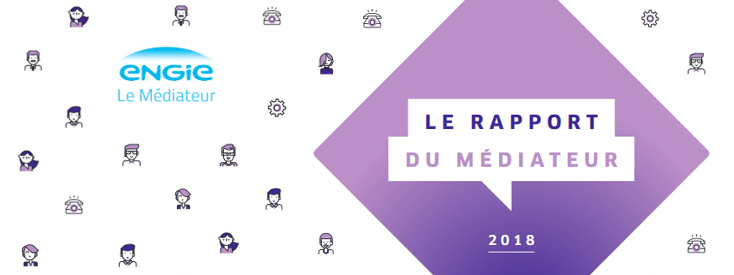Every year, the Ombudsman prepares a report that describes the different aspects of his activity, reviews the requests received, analyses the cases handled, and specifies his recommendations.
“This annual report showcases our independence and impartiality and serves as proof of the transparency of our mediation work with regard to all complainants,” says Jean-Pierre Hervé.
- Read the Ombudsman’s 2022 annual report
- View previous years’ annual reports: 2021 annual report, 2020 annual report, 2019 annual report, 2018 annual report, 2017 annual report, 2016 annual report, 2015 Annual Report, 2014 annual report, 2013 annual report, 2012 annual report, 2011 annual report, 2010 annual report, 2009 annual report.
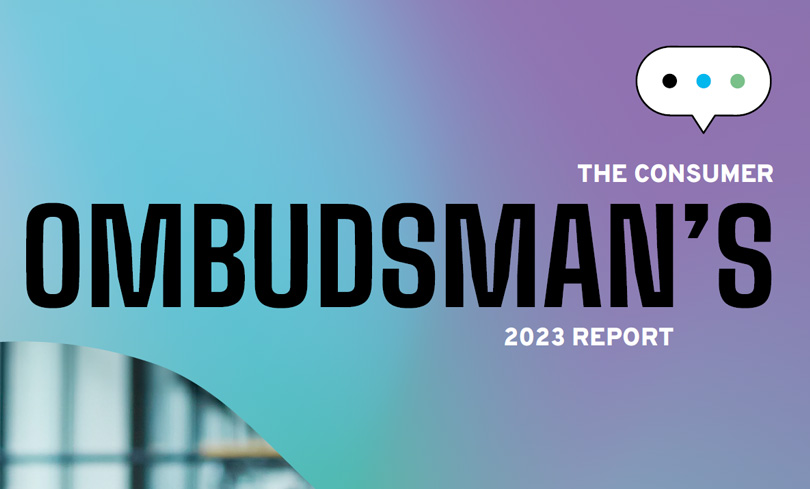
Read the Ombudsman’s 2023 annual report by clicking on the following link.
After an excellent year for mediation in 2022 (with a significant drop in the number of eligible referrals and a decline in the number of mediations for the first time), 2023 was the year of the energy crisis for consumers, as well as for ENGIE.
The Ombudsman consolidates the claimants’ satisfaction rate (91%) and maintains a high rate of amicable settlements (84%).
In 2023, the number of mediation requests surged by 40%, reaching 2,457 requests from individuals compared to the 1,772 received in 2022.
It was unprecedented! The number of mediation cases doubled: 782 eligible mediation requests in 2023 (393 in 2022).
Despite the exceptional volume of mediation requests, the average processing time for disputes was 63.4 days (vs. 58.7 in 2022), well below the legal deadline of 90 days.
ENGIE’s energy supply entities serve millions of energy customers and manage numerous contracts covering.
- market offers, Consumer Division (DGP),
- fully digital market offers like Happ-e,
- regulated tariff offers handled by the Regulated Tariffs Department (DTR) until its closure due to the phasing out of regulated tariffs).
These divisions are significantly impacted, representing 87% of the consumer mediations received by the Ombudsman. The remaining 13% concern ENGIE Home Services (EHS), FideloConso, and departments managing Energy Savings Certificates (as shown in the graphs below).
In 2023, the Ombudsman observed an unprecedented rise in disputes related to contracts. Over 50% of mediation cases were linked to contracts, compared to around 14% in 2022, representing an increase of nearly 6 points. Within the 48.5% of contract-related mediations, the predominant concerns were contract disputes, especially regarding price disputes upon renewal or when subscribing to new contracts in 2022. This surge can be attributed to the impact of new supplier offers amid price volatility and increased wholesale energy costs, which were reflected in retail prices (within the limits set by the tariff cap). The second most significant issue concerned billing or payment difficulties (30.5% in 2023 vs 61.8% in 2022), often stemming from misunderstandings about gas and electricity consumption levels or meter-related issues.
The related mediation rate & volume have globally decreased by half.
The “Energy Equipment” category decreased by nearly 3 points (9.8% in 2023 vs. 12.5% in 2022), the volume increased from around 50 disputes to nearly 80, reflecting requests concerning the installation, troubleshooting, and maintenance of household boilers, heat pumps, or photovoltaic panels.
Complaints related to electricity slightly outnumbered those related to gas, as in previous years.
Other mediation issues remained relatively minor, in line with previous years.
The number of mediation requests received from retail customers, by year.
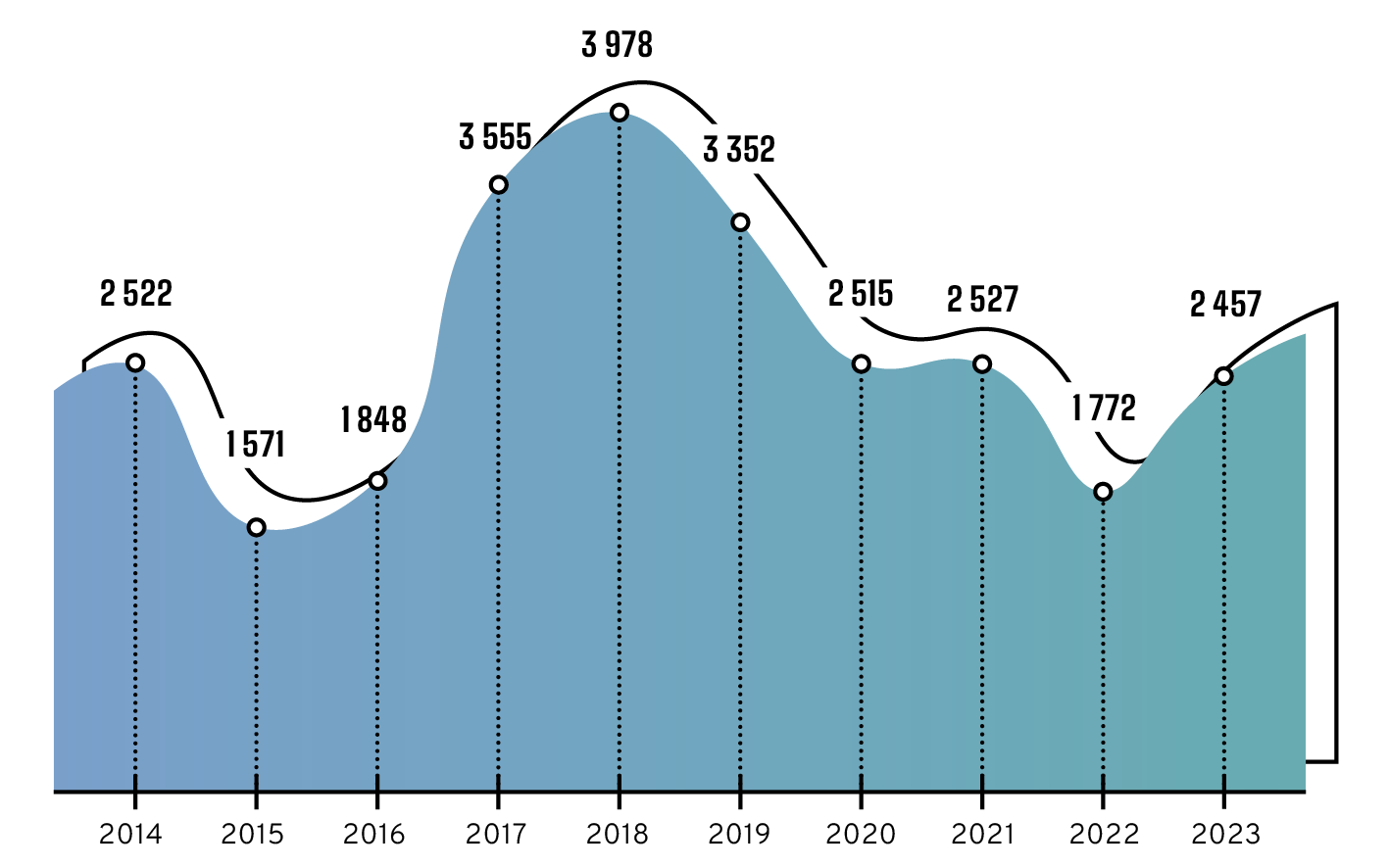
Eligible mediation requests from consumers
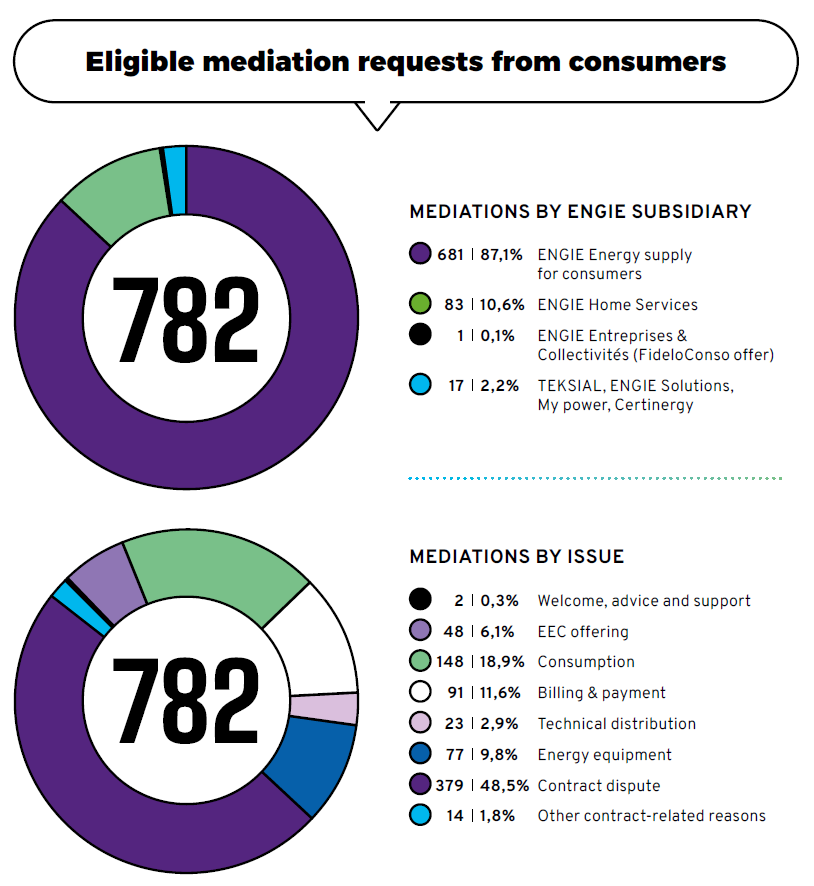
Recommendations made by the Ombudsman for the ENGIE Group in 2023
The Ombudsman issues recommendations to the relevant ENGIE Group entities based on the various disputes examined by the Mediation team. Through these recommendations, the Ombudsman suggests opportunities for improving the way in which customer requests are handled, as well as procedures and services. These are set out every year in the Ombudsman’s annual report. The Ombudsman subsequently works alongside the Group’s entities to ensure that his recommendations are implemented.
In 2023, based on the particular cases encountered during the working year, the Ombudsman was able to formulate eight recommendations as in 2022. They were discussed with the ENGIE Group business units concerned to ensure their implementation, as well as with consumer organisations.
The details of the recommendations are presented in the activity report on the Ombudsman’s website.
Recommendations related to the crisis
Recommendation N°1: Preserve the tariff study conducted at the customer’s move-in to demonstrate the quality of professional advice and justify the amount of the estimated monthly payment.
Entity concerned: Consumer energy suppliers
Recommendation No. 2: Align the payment schedule for monthly instalments with contractual periods rather than the rhythm of adjustment invoices. In particular, send the new payment schedule for the new instalments at the time of contract renewal.
Entity concerned: Consumer energy suppliers.
Recommendation No. 3: Eliminate renewal letters that do not clearly indicate that prices will significantly increase (upward) to encourage the consumer to compare their new price with the old one, and thus be able to make an informed choice. Indicate the old price and the new price on the contract renewal letter.
Entity concerned: Consumer energy suppliers
Recommendation No. 4: Indicate the kWh prices in cents rather than euros in contractual documents.
Entity concerned: Consumer energy suppliers
Recommendations beyond the crisis
Recommendation No. 1: Ensure not to exceed the framework of regulatory requirements in the payment of “Energy Savings Bonuses” and to remain compliant.
Entity concerned: DGP-CEE
Recommendation No. 2: Accompany consumption adjustments during the billing cycle with detailed information and explain complex accounting operations.
Entity concerned: Consumer Division (DGP)
Recommendation No. 3: Improve the complaints handling process for energy suppliers to prevent the Ombudsman from gradually becoming a complaint handling service.
Entity concerned: Consumer energy suppliers
Recommendation No. 4: Agree to implement a “Method Agreement” mediation solution that outlines the parties’ future responsibilities.
Entity concerned: ENGIE Home Services (EHS)
You can access the flick-through pdf by clicking on the following link.
The Ombudsman has improved the rate of acceptance by the parties of mediation solutions (87%) as well as the claimants’ satisfaction rate (91%).
In 2022, the total number of referrals to the Ombudsman fell by 20% compared to 2021, dropping to 3,046 requests from residential consumers (vs 3,815 in 2021). Of these, 1,274 customer requests were not passed on by ENGIE’s customer services. The number of referrals whose admissibility under Article L.612-2 of the French Consumer Code could be examined fell by 30% to 1,772 (vs 2,527 in 2021). The number of referrals received that were eligible for mediation decreased slightly: 393 eligible requests in 2022 (down 2% compared to 2021).
In 2022, the Ombudsman also handled 48 mediation cases that were received in 2021.
87% of the solutions proposed during these mediation cases were accepted by the parties and implemented, and 91% of the claimants stated they were satisfied with the Ombudsman’s intervention (against 92% in 2021). Lastly, the average case handling time was 58.7 days (against 57 in 2021), whereas the law fixes a maximum period of 90 days.
80.2% of consumer mediation cases received by the Ombudsman concerned energy suppliers (with the regulated tariff offer, Regulated Tariff division (DTR); or the market offer, Consumer division (DGP); or the fully digital market offer with ENGIE Happ-e).
The remaining 19.8% of cases are divided between the subsidiaries ENGIE Home Services (EHS), Entreprises & Collectivités (FideloConso offer) and those managing Energy Saving Certificates.
Mediation cases predominantly concern billing or payment problems (61.8% in 2022 vs 68.1% in 2021), due to a poor understanding of gas and electricity consumption levels and/or metering problems. As last year, electricity-related cases make up the majority, although there has been a sharp decline in referrals in this area. The “contract” category – which corresponds to tariff disputes, particularly on renewal, or difficulties with terminations – increased by almost 6 points (13.7% in 2022 vs 8% in 2021). This reveals the impact of new offers from suppliers during periods of volatility and rising energy purchase prices – an increase reflected in energy sale prices (within the limit allowed by the tariff shield).
The “energy equipment” category fell by about 2 points (12.5 per cent in 2022 vs 14.2% in 2021). This category relates to requests regarding the installation, repair, servicing and maintenance of individual boilers, heat pumps or solar panels.
Other reasons for mediation are less common, as in previous years.
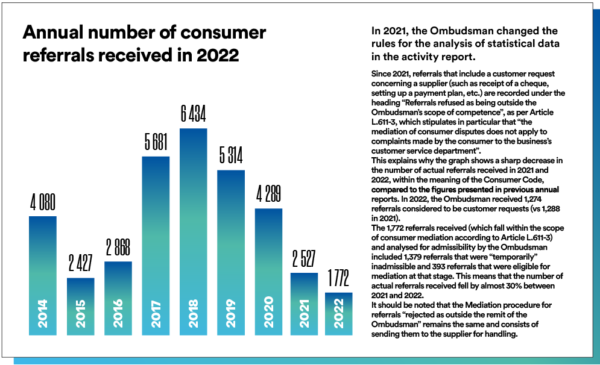
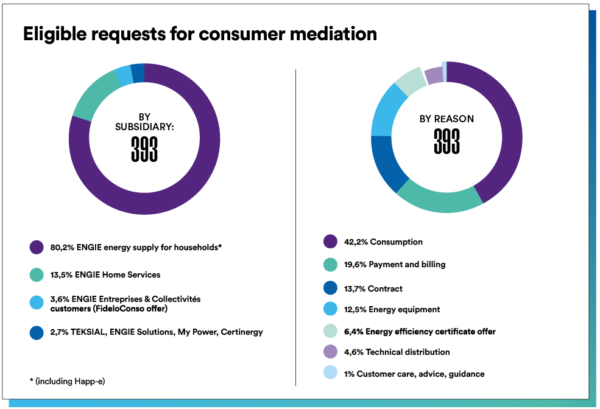
RECOMMENDATIONS FOR 2022 FROM THE OMBUDSMAN FOR THE ENGIE GROUP
The Ombudsman issues recommendations to the relevant ENGIE Group entities to reflect the different disputes examined by the Mediation team. Through these recommendations, the Ombudsman suggests opportunities for improving the way in which customer requests are handled, as well as procedures and services. These are set out every year in the Ombudsman’s annual report. The Ombudsman subsequently works alongside the Group’s entities to ensure that his recommendations are implemented.
In 2022, based on the particular cases encountered during the working year, the Ombudsman was able to formulate eight recommendations (vs. six in 2021). They were discussed with the ENGIE Group business units concerned to ensure their implementation, as well as with consumer organisations. The details of the recommendations are presented in the activity report on the Ombudsman’s website.
Recommendation 1: “Create a specific and specialised process to resolve situations where ENGIE’s customers cannot access their consumption data in their ENGIE customer space.”
Entity concerned: France Particuliers – Consumer division
Recommendation 2: “Improve energy suppliers’ complaints management process so that the Ombudsman does not end up replacing a complaints department.”
Entity concerned: France Particuliers – Consumer energy suppliers
Recommendation 3: “Adopt a position from the start of mediation on whether to pursue legal proceedings, in the face of possible fraud involving a claimant.”
Entity concerned: GRDF
Recommendation 4: “Improve billing by complying with the requirements set out in the billing decree (NOR EFIC1124216A)”
Entity concerned: France Particuliers – Happ-e
Recommendation 5: “Consistently verify that the energy transition law is applied for unusually high bills based on estimated readings”
Entity concerned: France Particuliers – Consumer division
Recommendation 6: “Send an explanatory letter to the customer when carrying out a complex accounting transaction”
Entities concerned: France Particuliers – Consumer energy suppliers
Recommendation 7: “Expand on the clause describing the principle of indexation to the regulated tariff in the relevant market offers.”
Entity concerned: France Particuliers – Consumer division
Recommendation 8: “Avoid debiting the account of an over-indebted customer by the amount stated in the over-indebtedness plan”
Entity concerned: France Particuliers – Consumer division
Click here to read the full annual report.
The Ombudsman has improved the rate of acceptance by the parties of mediation solutions (89%) as well as the claimants’ satisfaction rate (90%).
In 2021, the total number of referrals to the Ombudsman decreased by 11% compared to 2020, reaching 3,815 requests from individual consumers (vs. 4,289 in 2020). These referrals included 1,288 customer requests that did not pass through ENGIE’s customer services. The number of referrals whose admissibility, as per Article L.612-2 of the French Consumer Code, could be examined was 2,527. The number of actual referrals received, as defined by the French Consumer Code, is, therefore, significantly lower than in the presentations in other annual reports, down by 41% in 2021 compared with 2020. Accordingly, the number of referrals received that were eligible for consumer mediation increased, with 401 eligible applications in 2021 (+4.7% compared to 2020).
In 2021, the Ombudsman also handled 89 mediation cases that were received in 2020.
90% of the solutions proposed during these mediation cases were accepted by the parties and implemented, and 90% of the claimants stated they were satisfied with the Ombudsman’s intervention (against 90% in 2020). Lastly, the average case handling time was 58 days (against 63 in 2020), whereas the law fixes a maximum period of 90 days.
78.5% of consumer mediation cases received by the Ombudsman concerned energy suppliers (with the regulated tariff offer, regulated tariff division – DTR, or the market offer, the consumers division – DGP, or ENGIE Happ-e for low-cost offers). The remaining 21.5% were divided between the ENGIE Home Services and FideloConso subsidiaries.
The mediation cases predominantly concerned billing or payment problems due to a lack of understanding of gas and electricity consumption levels, and also metering problems. Like last year, electricity-related cases were predominant. The “energy equipment” category, which concerns mainly questions about the installation, repair or servicing and maintenance of individual boilers, heat pumps or photovoltaic panels, increased by 2 points.
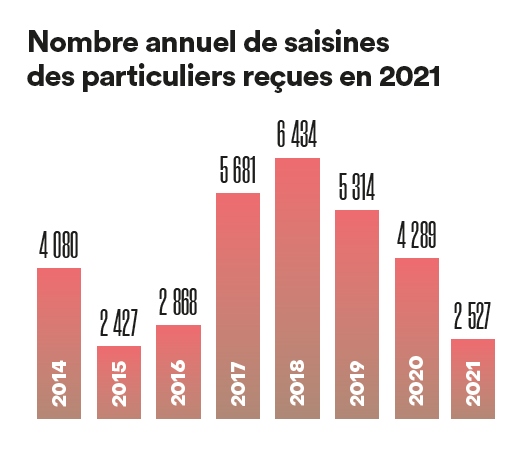
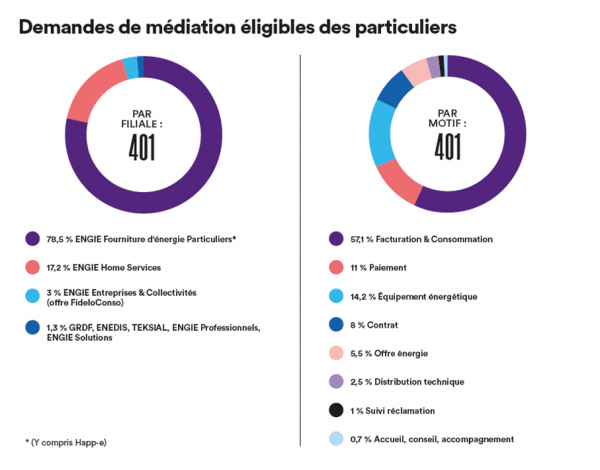
In February 2021, the CECM, or French State Commission for the Evaluation and Control of Mediation, renewed the accreditation of the Consumer Ombudsman for the ENGIE Group, Jean-Pierre Hervé, for five years. He is on the list of ombudsmen approved by the European Commission.
The 2021 recommendations of ENGIE Group’s Ombudsman
The Ombudsman issues recommendations to the relevant ENGIE Group entities to reflect the different disputes examined by the Mediation team. Through these recommendations, the Ombudsman suggests opportunities for improving the way in which customers and their requests are handled, as well as the procedures and services available. These are set out every year in the Ombudsman’s annual report. The Ombudsman subsequently works alongside the Group’s entities to ensure that his recommendations are implemented.
In 2021, the Ombudsman was able, based on the particular cases he encountered during his working year, to formulate six recommendations (vs. 15 in 2020). They were discussed with the ENGIE Group business units concerned to ensure their implementation, as well as with consumer organisations. The details of the recommendations are presented in the activity report on the Ombudsman’s website.
Entity concerned: France Particuliers: Consumer Division
Recommendation 2: “Pay particular attention to changes to the names on the contracts”
Entity concerned: France Particuliers: Consumer Division
Entity concerned: France Particuliers: Consumer Division
Entities concerned: France Particuliers: Consumer division, Happ-e
Entities concerned: France Particuliers: Consumer division, Happ-e
Entities concerned: France Particuliers, consumer energy suppliers
Click here to read the full annual report.
2020 assessment and highlights
The Mediator has improved the rate of acceptance by the parties of mediation solutions (89%) as well as the claimants’ satisfaction rate (90%).
In 2020, fewer referrals were made to the Mediator (4,569, down 17% on 2019). Correlatively, the number of mediation cases received held steady, with 413 requests qualifying for mediation in 2020 (down 2% on 2019), 383 of which from residential customers and 30 from other claimants (professionals, companies and local authorities). In total, the Mediation service handled 491 mediation cases in 2020, up 2.9% on 2019.
89% of opinions issued during these mediation cases were accepted by the parties and implemented, and 90% of the claimants stated they were satisfied with the Mediator’s intervention (against 86% in 2019). Lastly, the average case handling time was 63 days (against 62 in 2019), whereas the law fixes a maximum period of 90 days.
Again this year, most of the mediation cases were referred by residential customers (93%, 383 out of the 413 referrals received). Professionals account for 5.8% of the requests for mediation, which qualify for mediation under the Energy Code.
Most mediation cases concern billing or payment problems due to a lack of understanding of the level of gas and electricity usage, and also include metering problems. As last year, electricity-related cases predominate. The “energy equipment” category concerning among other things requests in connection with the installation, repairs or servicing and maintenance of individual boilers, heat pumps or solar panels is up 10 percent.
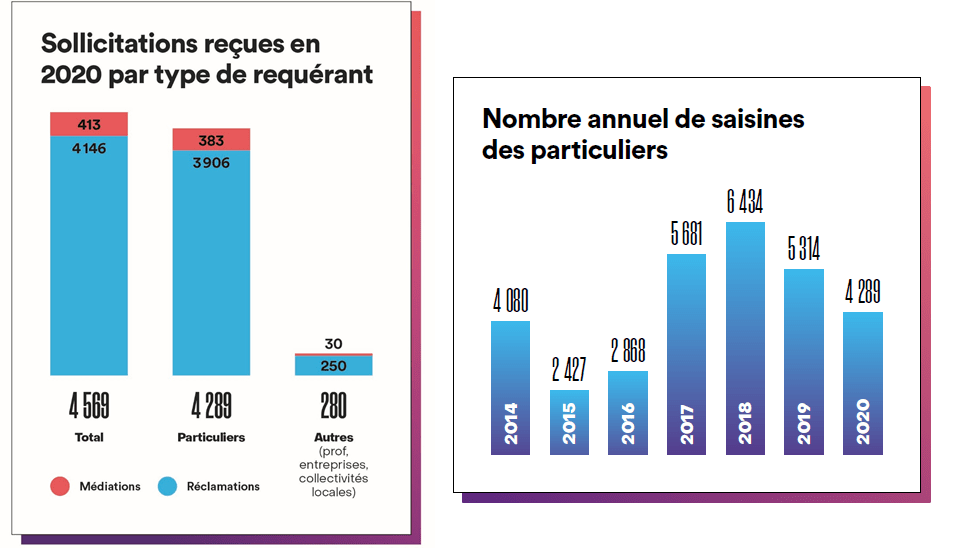
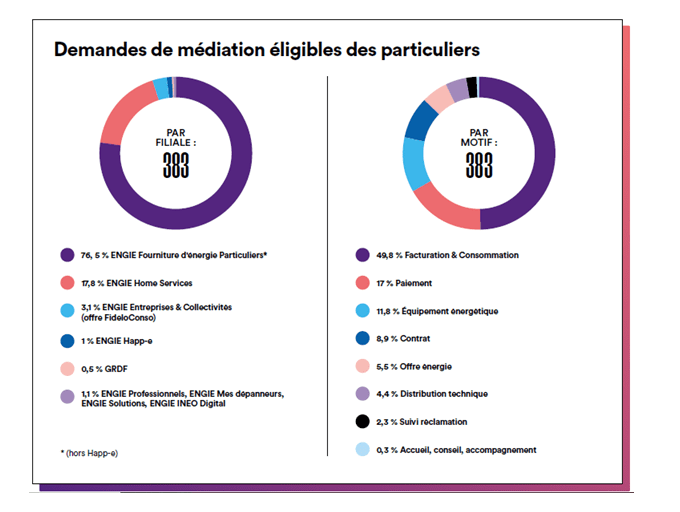
The National Consumer Mediation Assessment and Control Commission (CECMC) renewed Jean-Pierre Hervé’s accreditation as consumer mediator for the ENGIE Group in February 2021 for five years. He is on the list of mediators approved by the European Commission.
The 2020 recommendations of the ENGIE Ombudsman
The Mediator issues recommendations to the relevant ENGIE Group entities to reflect the different disputes examined by the Mediation team. Through these recommendations, the Mediator suggests opportunities for improving the way in which customers and their requests are handled, as well as the procedures and services available. These are specified each year in the Mediator’s annual report. The Mediator subsequently works alongside the Group’s entities to ensure that his recommendations are implemented.
In 2019 the Mediator made 15 recommendations (vs 7 in 2019) on the basis of the particular cases he encountered during his year in office. They were discussed with the ENGIE Group business units concerned to ensure their implementation, as well as with consumer organizations. The details of the recommendations are presented in the activity report on the Mediator’s website.
Entités concernés : France Particuliers : Direction Grand Public
Recommandation 2 : « Prise en compte de la date d’envoi pour vérification des délais impartis »
Entités concernées : France Particuliers : Direction Grand Public
Entités concernées : France Particuliers : Direction Grand Public
Recommandation 4 : « Explication inversion d’un point de livraison (PDL) »
Entités concernées : France Particuliers : Direction Grand Public
Entité concernée : France Particuliers : Direction Grand Public, Happe
Entité concernée : France Particuliers : Direction Grand Public, Direction Tarifs Réglementés, Happe
Entité concernée : France Particuliers : Direction Grand Public, Direction Tarifs Réglementés
Entité concernée : France Particuliers : ENGIE Home Services
Entité concernée : France Particuliers : ENGIE Home Services
Entité concernée : France Particuliers : ENGIE Home Services
Entité concernée : France Particuliers : Distributeur ENEDIS
Entité concernée : Distributeur GRDF
Entité concernée : Distributeur GRDF
Entité concernée : ENGIE Solutions
Entité concernée : Tous les professionnels avec des particuliers et des petits professionnels
2019 assessment and highlights
The Ombudsman has improved the rate of acceptance by the parties of mediation solutions (90 %) as well as the claimants’ satisfaction rate (86 %). This is against a backdrop of rising numbers of requests (+ 33 %) des médiations traitées plus complexes.
As in 2018, the total number of requests to the Ombudsman rose in 2019, up to 5,497 (-17 % compared with 2018). Correlatively, the number of mediation cases increased, totalling 421 admissible cases in 2019 (+ 29 % compared with 2018). 97 % of these mediation cases received, or 410 mediations, were related to private customers. In total, the mediation service handled 477 mediation cases in 2019, + 22,9 % compared with 2018.
90 % of notices issued during these mediation cases were accepted by the parties and implemented, and 86 % of the claimants stated they were satisfied with the Ombudsman’s intervention (against 84 % in 2018). Lastly, the average case handling time was 62 days (against 66 in 2018), whereas the law fixes a maximum period of 90 days.
Once again this year, most of the requests received and mediation processes carried out concerned customers’ comprehension of bills, regularisation of amounts further to incorrect meter readings or adjustments to meter readings following meter failures.
Like last year, electricity-related cases are in the majority.
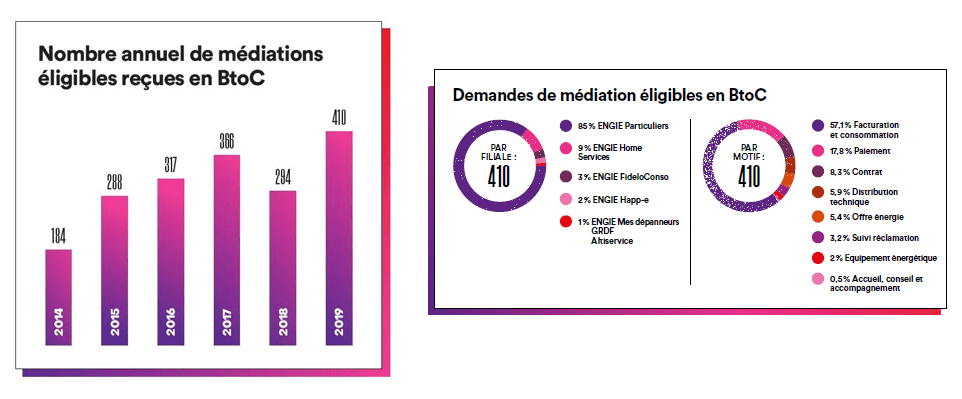
Since 25 February 2016, the independence of the ENGIE Group’s Ombudsman has been confirmed: he has been accredited “Consumption Ombudsman” by the CECM or (State) Commission for Evaluation and Control of Mediation and his report meets the criteria set out in the French Consumer Code (Order of 20 August 2015). He is on the list of ombudsmen approved by the European Commission.
The 2019 recommendations of the ENGIE Ombudsman
Further to the various disputes he examines, the ENGIE Group’s Ombudsman makes recommendations to the ENGIE group entities concerned. These recommendations suggest areas for improvement in the handling of customers and their requests, in procedures and in the services offered. These are specified each year in the Ombudsman’s annual report. The Ombudsman then works with these entities to ensure his recommendations are followed through.
In 2019, the Ombudsman was able, based on the particular cases he encountered during his working year, to make 7 recommendations (vs 14 in 2018). They were discussed with the ENGIE Group business units concerned to ensure their implementation, as well as with consumer organisations. The details of the recommendations are presented in the activity report on the Ombudsman’s website.
2018 assessment and highlights
The Ombudsman has improved the rate of acceptance by the parties of mediation solutions (88%) as well as the claimants’ satisfaction rate (84%). This is against a backdrop of rising numbers of requests (+11%) and more complex mediation cases, despite the latter falling in number (-8%) for the first time since the arrival of Jean-Pierre Hervé. It is worth noting 3 new points in 2018:
- electricity-related cases are in the majority,
- a rise in the number of mediation cases concerning service offers,
- and the ENGIE Group’s Ombudsman is the ombudsman of “MES DÉPANNEURS.fr”.
As in 2017, the total number of requests to the Ombudsman rose in 2018, up to 6,646 (+ 11% compared with 2017 and 115% compared with 2016). Correlatively, the number of mediation cases fell, totalling 327 admissible cases in 2018 (17% down on 2017). In total, the mediation service handled 387 mediation cases in 2018, 8.3% down on 2017.
88% of notices issued during these mediation cases were accepted by the parties and implemented, and 84% of the claimants stated they were satisfied with the Ombudsman’s intervention (against 89% in 2017). Lastly, the average case handling time was 66 days (against 59 in 2017), whereas the law fixes a maximum period of 90 days.
Once again this year, most of the requests received and mediation processes carried out concerned customers’ comprehension of bills, regularisation of amounts further to incorrect meter readings or adjustments to meter readings following meter failures.
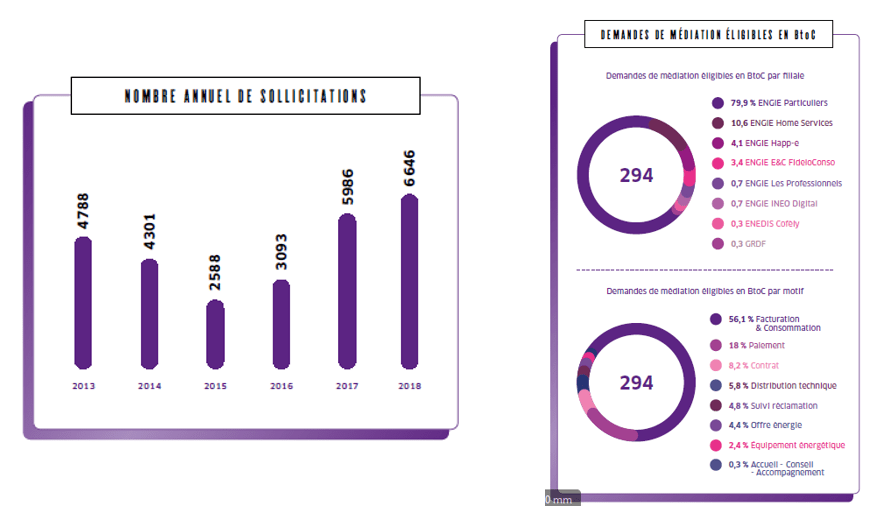
Since 25 February 2016, the independence of the ENGIE Group’s Ombudsman has been confirmed: he has been accredited “Consumption Ombudsman” by the CECM or (State) Commission for Evaluation and Control of Mediation and his report meets the criteria set out in the French Consumer Code (Order of 20 August 2015). He is on the list of ombudsmen approved by the European Commission.
The 2018 recommendations of the ENGIE Ombudsman
Further to the various disputes he examines, the ENGIE Group’s Ombudsman makes recommendations to the ENGIE group entities concerned. These recommendations suggest areas for improvement in the handling of customers and their requests, in procedures and in the services offered. These are specified each year in the Ombudsman’s annual report. The Ombudsman then works with these entities to ensure his recommendations are followed through.
In 2018, the Ombudsman was able, based on the particular cases he encountered during his working year, to make 14 recommendations (vs 13 in 2017). They were discussed with the ENGIE Group business units concerned to ensure their implementation, as well as with consumer organisations. The details of the recommendations are presented in the activity report on the Ombudsman’s website.
The recommendations in the 2018 Annual Report are listed below :
- Recommendation 1: “Activate the electricity contract on an actual or customer meter reading”
Unit: ENGIE - Recommendation 2: “The supplier must state the nature (actual or estimated) of consumption displayed on the Cap EcoConso tool”
Unit: ENGIE & Gaz Tarif Réglementé - Recommendation 3: “The supplier must provide detailed training for advisers on the Cap EcoConso offer”
Unit: ENGIE & Gaz Tarif Réglementé - Recommendation 4: “With regard to door-to-door selling, the supplier must ascertain that its customers have the legal capacity to contract”
Unit: ENGIE - Recommendation 5: “On a bimonthly bill, the wording in the ‘Your billed usage’ box on the first page is incorrect in some cases”
Unit: ENGIE & Gaz Tarif Réglementé - Recommendation 6: “In cases of inheritance, tenancy in common or divorce, etc., the supplier must ascertain the legitimacy of the person requesting any action on a contract (opening, closing, changing)”
Unit: ENGIE & Gaz Tarif Réglementé - Recommendation 7: “Allow input of a foreign telephone number as contact number for a customer in the supplier’s information system”
Unit: ENGIE & Happ-e - Recommendation 8: “Inform suppliers of what arrangements to make vis-à-vis customers when changing an old meter that exceptionally was part of a faulty series (that underestimated the reading) and led to complaints”
Unit: GRDF & Enedis - Recommendation 8.1: “Inform suppliers of what arrangements to make vis-à-vis customers when changing an old meter that exceptionally was part of a faulty series (that underestimated the reading) and led to complaints”
Unit: GRDF - Recommendation 8.2: “Inform suppliers of what arrangements to make vis-à-vis customers when changing an old meter that exceptionally was part of a faulty series (that underestimated the reading) and led to complaints”
Unit: Enedis - Recommendation 9: “Shorten the time taken to respond to requests for information from the ENGIE Group’s Mediation team”
Unit: Enedis - Recommendation 10: “The supplier must specify the peak and off-peak hours on the bills sent to business customers”
Unit: Direction des Clients Professionnels (DCP) - Recommendation 11: “The supplier Happ-e should clarify the conditions for obtaining the sponsorship premium on its web site”
Unit: Happ-e - Recommendation 12: “The supplier must put in place actions to support customers during their contract if particular events impact on their billing”
Unit: ENGIE Entreprises & Collectivités - Recommendation 13: “The supplier must clearly inform the customer that he cannot obtain both an energy efficiency certificate premium and a loan at a preferential rate for the same equipment”
Unit: ENGIE Home Services - Recommendation 14: “If a boiler constantly breaks down in wintry conditions, whenever possible spontaneously propose alternative back-up heating solutions”
Unit: ENGIE Home Services

